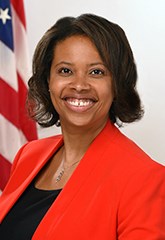In a new blog post, Chiquita Brooks-LaSure, administrator, Centers for Medicare & Medicaid Services (CMS), reflects on her first 100 days in office and her vision for the future.
 While the country has learned a lot during the COVID-19 pandemic on the ways to access comprehensive health care, CMS Administrator Chiquita Brooks-LaSure, said that the last 19 months has been a challenge and has put an incredible strain on the U.S. health care infrastructure. It also has highlighted weaknesses and disparities that require smart and innovative solutions.
While the country has learned a lot during the COVID-19 pandemic on the ways to access comprehensive health care, CMS Administrator Chiquita Brooks-LaSure, said that the last 19 months has been a challenge and has put an incredible strain on the U.S. health care infrastructure. It also has highlighted weaknesses and disparities that require smart and innovative solutions.
Brooks-LaSure noted in a new blog post that she is marking her first 100 days of leading CMS and therefore wants to lay out her strategy for how CMS will achieve its vision to advance health equity, expand coverage, and improve health outcomes. Everything the agency does, she said, should align with one of more of six strategic pillars:
- Advance health equity by addressing the health disparities that underlie the country’s health system
- Build on the Affordable Care Act and expand access to quality, affordable health coverage, and care
- Engage our partners and the communities we serve throughout the policymaking and implementation process
- Drive innovation to tackle our health system challenges and promote value-based, person-centered care
- Protect our programs' sustainability for future generations by serving as a responsible steward of public funds
- Foster a positive and inclusive workplace and workforce, and promote excellence in all aspects of CMS' operations
“In the short time I have been CMS Administrator, we have already made significant progress on these pillars, focusing our efforts on improving health equity and access to coverage by working across what I call “the three Ms”: Medicare, Medicaid & CHIP, and the ACA Marketplaces,” she said.
As an example, she cited the fact that more than 2.5 million Americans enrolled in federal and state marketplaces during a special enrollment period, and millions of consumers found coverage for $10 or less per month.
“For every decision being made, we’re asking ourselves ‘how is this action advancing health equity?’"she said. That shift in perspective has led to a proposed rule to support home care workers’ access to benefits; providing Medicare enrollees who are battling End-Stage Renal Disease (ESRD) with greater access to care; increased availability of home-based community services so that seniors and people with disabilities can receive the care they need in their own homes and communities, including increasing access to COVID-19 vaccinations.
“We will work tirelessly to address the gaps in the health care system exposed by the COVD-19 pandemic. On behalf of people who rely on our programs, I and the more than 6,000 dedicated professionals who make up CMS are committed to driving innovative solutions to make comprehensive health care more equitable, more accessible, and more affordable,” she said.
To learn more about the agency’s plan for the next 10 years, see Brooks-LaSure’s August blog post in Health Affairs.
